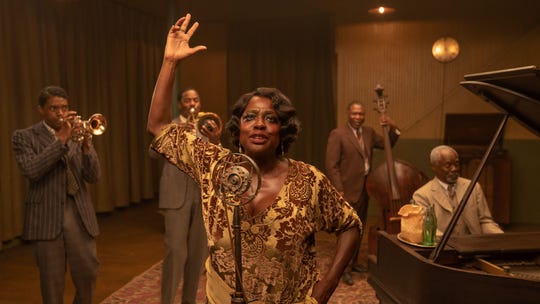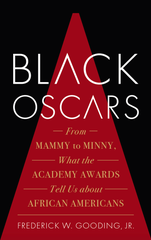In what Variety labeled an “Oscar diversity record,” nine actors of color were nominated this year for Academy Awards.
The milestone presented a hopeful contrast to 2016, when all 20 acting nominees were white, a situation that sparked the critical social media hashtag #OscarsSoWhite.
But Dr. Frederick W. Gooding Jr., an author and professor at Texas Christian University, cautions that achieving meaningful diversity in the acting categories may have more to do with the quality of roles than with the quantity of nominations.

Dr. Frederick W. Gooding Jr. (Photo: TCU)
“What does it tell us if the Black women winning Academy Awards 70 years apart are still playing maids?” he asked, citing the Oscar-recognized performances of Hattie McDaniel in “Gone With the Wind” (1939) and Octavia Spencer in “The Help” (2011).
Gooding, 46, is the author of a statistical, historical and analytical book titled “Black Oscars: From Mammy to Minny, What the Academy Awards Tell Us About African Americans.” Published by Roman & Littlefield last year, the subtitle refers to the characters played by McDaniel and Spencer.
Five days before this year’s 93rd Academy Awards ceremony, on April 25, Gooding is coming to Memphis — virtually speaking — for a Zoom discussion of race and the Oscars that is set to start at 10:15 a.m. Tuesday.
RELATED EVENTS: ’21 Grams’ to ‘Walk the Line’: Memphis movie and TV walking tour planned in Central Gardens
Presented by Memphis Public Libraries, the event is part of the library system’s “Virtual Books and Beyond” series. Tajuana Fulton of the Frayser Branch Library and Joshua Thomas of the Benjamin L. Hooks Central Library’s Humanities Department will host the interactive discussion, which Gooding says will feature clips from movies and other visual and audio snippets to make it — he hopes — more entertaining than a typical lecture or “book talk.”
“I think having this program and having this conversation is important in the larger cultural context of promoting Black artists and the contributions that they make,” Fulton said. “People are really looking at that nowadays, and kind of rethinking ideas of representation and recognition.”
An associate professor at the John D. Roach Honors College at TCU, Gooding credits his mother, Sheila Gooding, with igniting his not uncritical love of movies.
Growing up in Philadelphia, “resources were limited, and movies were a very convenient way to provide entertainment,” he said. “Mom didn’t have a college education, but she was very gifted at what I now know as film analysis. She would press pause on the VHS and say, ‘Oh, did you see that?’ and she would rewind, and we would laugh and look at all the nuances in the movies.”
TV NEWS: Memphis animated series ‘The Mound’ coming to Oprah Winfrey Network
ON NETFLIX: Bingeing ‘Buried by the Bernards’: Highlights from the made-in-Memphis series

Viola Davis is Oscar-nominated for her role as famous blues singer Ma Rainey in “Ma Rainey’s Black Bottom.” (Photo: [Netflix])
Gooding also is the author of “You Mean There’s Race in My Movie?,” described as an “instructor’s manual” for analyzing racial representations in mainstream Hollywood cinema. He said he decided to write a book specifically about “Black Oscars” because the Academy Awards are so prestigious, so heavily hyped and so central to the popular perception of what constitutes a quality motion picture.
As the blurb promoting his book states: “Second only to the Super Bowl in audience size and revenue, the Oscars are more than a mere ceremony; they are a phenomenon. Hosted by The Academy of Motion Picture Arts and Sciences… the Oscars have long been considered the pinnacle of fantasy, beauty, romance and high class.”
Said Gooding: “In actuality, the larger beef that we as audiences should have is with Hollywood. But in many ways, the Oscars provide us with a fixed, finite lens. It is the tip of a larger iceberg in terms of the mechanism of Hollywood itself.”
To focus just on the most visible and “glamorous” categories of Actor, Actress, Supporting Actor and Supporting Actress, Black performers have been nominated 82 times in Oscar history, and have won 19 times.
Gooding said that Oscar-recognized Black actors often appear in known stories about real people. Examples include “Glory,” “12 Years a Slave,” “Ray,” “Hidden Figures,” “Harriet” and this year’s “Judas and the Black Messiah,” “Ma Rainey’s Black Bottom” and “One Night in Miami,” three films with five acting nominations for Black actors among them. Some of these are “insular” films with essentially entirely Black casts. The films often depict people who are traumatized or brutalized or at least disrespected because of their skin color.
Said Fulton: “Black trauma is often the only lens through which Black experiences are legitimized, through nominations and awards, in the entertainment industry, and that is incredibly unfortunate.”
MUSIC NEWS: Memphis rapper Clay ‘Krucial’ Perry III moves from behind the board to behind the mic
MEMPHIS AND THE OSCARS: Here are 20 Academy Award moments with a Bluff City connection

“Black Oscars” (Photo: Rowman & Littlefield Publishers)
Meanwhile, when Black and white characters do share the screen in original fictional stories, “the subconscious racial hierarchy typically is made manifest,” he said, as in “The Help,” in which the person who most materially benefitted from the plot’s various schemes was the white would-be writer played by Emma Stone, who essentially used material garnered from Black domestics to propel herself to a career in New York.
“I ask audiences all the time, ‘Who does ‘The Help’ help?'” he said.
At the same time, Black audiences routinely are expected to embrace or adopt the viewpoints of white protagonists.
“Growing up, Indiana Jones was my hero. Bruce Willis in ‘Die Hard.’ Arnold Schwarzenegger, ‘Commando.’ I adopted and accepted these individuals as my heroes. When we ask white audiences to do the same, it’s like, whoa, pump the brakes, we can’t have too many” films like “Black Panther.”
“While I am critical, I do love the movies and I do not have an ax to grind,” he said. “If anything, my critiques come from wanting this imaginative space that we all share to be an equitable space.”
‘BLACK OSCARS’: A Virtual Discussion and Program with Dr. Frederick Gooding Jr.
10:15-11:30 a.m. Tuesday, April 20.
Hosted by Memphis Public Libraries.
To participate, visit memphislibrary.org and scroll down to click on the link to the event.
Or call-in (audio only): 901-440-0342. Phone Conference ID: 376 137 715#.
Read or Share this story: https://www.commercialappeal.com/story/entertainment/movies/2021/04/15/black-oscars-academy-awards-discussion-frederick-w-gooding-jr-memphis-library/7124494002/
Credit: Source link


